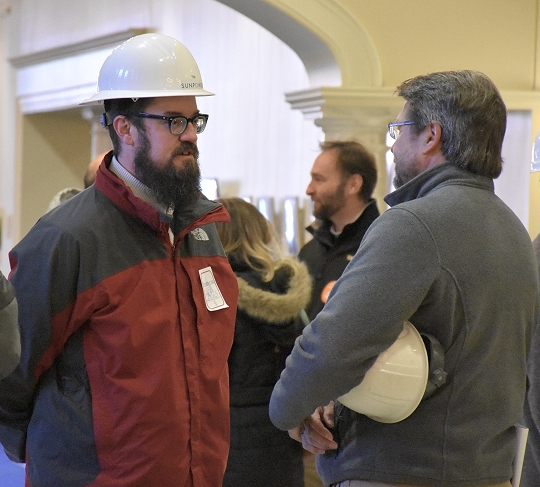 Solar workers Tim Gillen, left, and Harry Benson arrive in Annapolis on Thursday, February 11, to show support for pending legislation that would require electric companies to reduce the time it takes to connect customers' energy panels to their power grids. (Photo: Leo Traub)
Solar workers Tim Gillen, left, and Harry Benson arrive in Annapolis on Thursday, February 11, to show support for pending legislation that would require electric companies to reduce the time it takes to connect customers' energy panels to their power grids. (Photo: Leo Traub)ANNAPOLIS (Feb. 11, 2016)—When solar power customers have energy panels installed on their houses, they are often excited to begin running on their own electricity.
But sometimes, after installation, customers can end up waiting more than two months for authorization from their electric company to “interconnect”—or hook up—their panels to the power grid, said Erin Kelley, project lead for private solar panel provider Direct Energy Solar.
“Customers are usually really anxious at the end,” Kelley said. “They’ve paid for the system at this point, so why shouldn’t they be able to turn it on?”
Solar workers and utility representatives met with legislators in Annapolis on Thursday to show support for a bill that would require electric companies to complete the process of interconnecting customers’ solar panel systems within 20 business days, or about 30 calendar days.
Pepco’s 2014 interconnection time in Maryland was on average 76 days and Baltimore Gas and Electric Co.’s was 15, according to an EQ Research report.
One day’s delay in installing customers’ rooftop solar panels would cost the U.S. a total of $4 million in lost energy generation, according to an April Department of Energy report based on deployment numbers projected for the rest of 2015.
In addition to the lag time that may occur after a panel system has been installed, customers may also need to wait for electric companies’ approval at the beginning of the process.
The lag time at the beginning is typically due to paperwork that must be mailed back and forth between customers and the electric company, Kelley said.
Companies have acknowledged that the “routine delays” were a systemic issue, said Delegate Benjamin Kramer, D-Montgomery, who sponsored the bill.
To address the issue, Pepco is in the final stages of testing an online application process that would eliminate paperwork, provide updates and allow customers real-time access to their application status, a utility representative wrote in an email.
In a written statement, which did not address the length of the company’s 2014 interconnection waiting time, Pepco said they would support the bill with an amended waiver for electrical companies to exceed the required 20 business days in the event of “circumstances that may delay an interconnection, like severe weather or unsafe conditions.” BGE issued a similar written statement recommending the same amendment.
“We completely understand that in the event of some sort of natural disaster that they be held to a longer response time,” said Dana Sleeper, executive director of Maryland DC Virginia Solar Energy Industries Association.
Another solar bill, called the Maryland Clean Energy Jobs Act of 2016, would bring the percentage of solar power that makes up all retail electricity sales in the state up to 2.5 percent by the year 2020. Currently, the requirement set by Maryland’s renewable energy portfolio standard, or the regulation for how much renewable energy the state uses, is 2 percent for solar power by 2020.
The state’s renewable energy standard also sets requirements for the percentages of power from hydroelectric, biomass and wind sources.
The efficiency of solar panels’ power production has increased dramatically over the past few years, said Tim Gillen, regional sales manager for solar company Sunpower.
Advancements in solar energy have led to reductions in the costs of panel systems and installation fees, which have gone down 70 to 80 percent over the past four years, said Maryland DC Virginia Solar Energy Industries Association Board President Chris Ercoli.
With interest in solar power spreading across the country, production costs for individual systems have gone down, Ercoli said.
“We’re really encouraging the use of solar through rebates and low-interest loans,” said Kramer.
“Everybody is concerned now about the coal industry and the low gas prices, but there’s a shift happening,” alternative energy company Everpower Director Harry Benson said. “Solar energy is hiring people and wind energy is hiring people. The industry is growing.”


